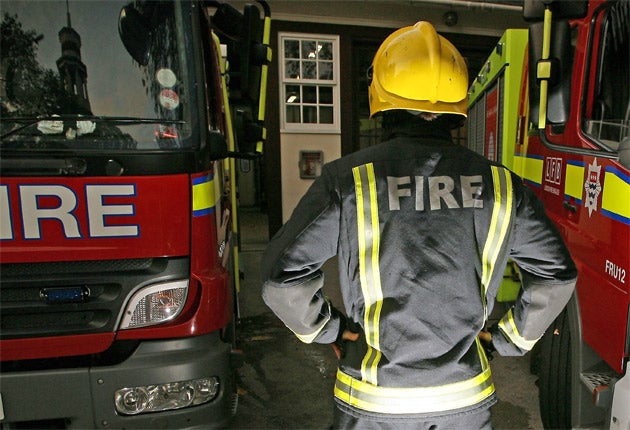Firefighters say 'savage' budget cuts could put lives in danger
Investigation by 'The Independent' reveals some areas face loss of hundreds of posts

Your support helps us to tell the story
From reproductive rights to climate change to Big Tech, The Independent is on the ground when the story is developing. Whether it's investigating the financials of Elon Musk's pro-Trump PAC or producing our latest documentary, 'The A Word', which shines a light on the American women fighting for reproductive rights, we know how important it is to parse out the facts from the messaging.
At such a critical moment in US history, we need reporters on the ground. Your donation allows us to keep sending journalists to speak to both sides of the story.
The Independent is trusted by Americans across the entire political spectrum. And unlike many other quality news outlets, we choose not to lock Americans out of our reporting and analysis with paywalls. We believe quality journalism should be available to everyone, paid for by those who can afford it.
Your support makes all the difference.Heavy cuts to fire-service funding will force up to 1,500 job losses – many of them firefighters – and the closure of stations around the country, shows a survey by The Independent. Critics warned that lives could be at risk as fire brigades felt the impact of the savage squeeze on public spending.
Although the pain is being shared by fire authorities of all sizes, some of the heaviest cuts will affect in major urban centres. They include Tyne and Wear, Merseyside and Humberside, each of which is to lose 170 posts, and Cleveland, which faces a £9m cut in its £33m fire-and-rescue budget.
The West Midlands, the hardest-hit of the metropolitan authorities, will have to find savings of £6.7m next year and is braced for further reductions in 2012-13. It says about 300 posts could be shed by natural wastage over four years, although unions fear between 500 and 800 jobs are in danger.
Smaller forces where there are warnings of job losses include Shropshire (50), Co Durham (40) and Berkshire (24). Authorities say most posts will be lost by not replacing firefighters who leave or retire, although some are not ruling out redundancies. They also say they aim to minimise job losses by freezing pay, closing or merging fire stations and scrapping engines.
But Matt Wrack, the Fire Brigades Union general secretary, said: "Cutting the number of fire stations and firefighters means it takes longer to answer emergency calls and that puts lives at risk. In firefighting, seconds can be the difference between life and death."
Ministers are urging fire authorities to avert redundancies by introducing more flexible work patterns, sharing senior staff and improving procurement methods. Fire authorities rely on a combination of Whitehall grants and money from council taxpayers for their income – the proportion varies from area to area – but both sources of revenue are under pressure because of the austerity drive. Central funding for fire authorities is being slashed by 25 per cent over four years, with the heaviest cuts expected in 2013-14 and 2014-15.
Increases in council precepts – money allocated by local authorities to fire services – are likely to lessen the impact, but fire chiefs are still preparing for an overall cut in income of 12 per cent over the period.
Lee Howell, vice president of the Chief Fire Officers Association, said: "We will be operating with fewer staff, but that does not necessarily mean an impact on public safety." He said savings could be achieved through "innovation and creative thinking", such as combining back-office operations. But he added: "Some services are already very efficient and will find it difficult to find further efficiencies."
Some authorities believe the axe has fallen too heavily in urban areas, with county brigades escaping relatively lightly. Martin Clark, deputy chief officer of the West Midlands Fire Service, said: "We are lobbying ministers and others to take into account the challenges we face. The metropolitan fire authorities have suffered the greatest cuts."
A spokesman for the Department for Communities and Local Government said: "As a frontline service, the fire and rescue service has been given some protection within the spending review settlement. Reductions are back-loaded to give them time to make the necessary changes without affecting the quality and breadth of services they provide."
But Chris Williamson, the shadow Local Government minister, said fire chiefs had told him that firefighters would lose their jobs, fire stations would be closed and appliances would be taken out of service. "The safety of the public could be put at risk because of the way the Tory-led Government has cut fire service budgets," he said.
'Independent' survey results
Greater Manchester Faces cuts of £23m over four years. Up to 200 firefighter posts to go, as well as 140 civilian jobs.
West Yorkshire Firefighter recruitment suspended. 150 support posts axed.
Merseyside 170 posts to go, including 92 firefighters.
Humberside 170 jobs cuts; fire engines cut from five to four.
Tyne & Wear 170 posts being lost.
Cleveland Being asked to find cuts of £9m from £33m budget.
West Midlands Expected to lose more than 300 posts through natural wastage. Redundancies not ruled out.
County Durham/ Darlington 40 jobs to go.
Essex Hadleigh fire station closed, Canvey Island now part-time, two stations losing a full-time firefighter.
Cambridgeshire Needs to find £4m in savings. Stanground and Dogsthorpe fire stations could be merged, or Stanground downgraded with 16 job losses.
Shropshire Up to 60 jobs being lost.
Join our commenting forum
Join thought-provoking conversations, follow other Independent readers and see their replies
Comments